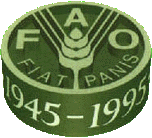|
|
|
Food and agriculture: the future
Dimensions
of Need
|
 |
The right to food
 |
 |
| The most basic of human rights is
the right to adequate food and nutrition. |
FAO seeks to mobilize
international and national support for the establishment
of world food security. |

No human right is more
fundamental than the right to food. Other human rights mean
relatively little to those who are starving. Yet, although the
world has enough food for all - and its average availability per
caput has increased over the past three decades - some 800
million people are still chronically malnourished. Although the
diets needed to provide the nutrients essential for a healthy and
productive life are known, an estimated 2 000 million people
still suffer from micronutrient deficiency diseases.
The United Nations, since its inception, has insisted that
access to adequate food is a universal human right and a
collective responsibility of the world community. In 1948 the
Universal Declaration of Human Rights recognized that
"everyone has the right to a standard of living adequate for
the health and well-being of himself and his family, including
food...". In 1966, the International Covenant on Economic,
Social and Cultural Rights developed this more explicitly,
stressing the "right of everyone to... adequate food"
and specifying that everyone's fundamental right is to be free of
hunger. The same rights were reaffirmed at the 1974 World Food
Conference.
FAO's Constitution clearly sets out its intention of ensuring
humanity's freedom from hunger and calls on governments to take
action, individually and collectively, to help to bring this
about. The Organization looks beyond promoting food production to
examining conditions for a stable food supply and to aiming to
ensure that everyone always has both physical and economic access
to basic food needs. In 1983 the FAO Conference adopted three key
guidelines for world food security: ensuring adequate food
availability; providing access to food, particularly for the
poor; and enhancing the stability of food supplies. FAO continues
to press for wider recognition of the right to food and, in 1992,
it initiated the Declaration of Barcelona which emphasizes food
rights and seeks to mobilize support from international
organizations, governments, non-governmental organizations and
individuals. This right to food found a practical expression in
the Plan of Action adopted by the joint FAO/WHO International
Conference on Nutrition in 1992.



